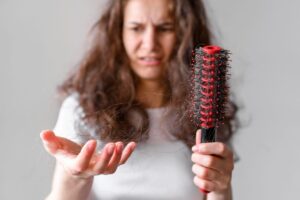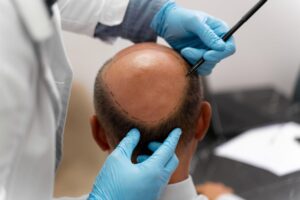Last updated on July 7th, 2025 at 05:15 pm
Hair loss treatment refers to a range of medical and cosmetic interventions aimed at preventing, slowing down, or reversing hair loss and promoting the growth of new hair. From a cosmetic concern to a matter of personal confidence, the health and appearance of our hair play a significant role in our self-esteem and overall well-being.
Hair loss is a common and often distressing condition that can affect both men and women at various stages of life. While it’s natural to shed some hair daily, excessive hair loss can lead to thinning or bald patches, causing self-esteem issues and emotional distress. Fortunately, there are numerous hair loss treatments available today, ranging from lifestyle changes and topical solutions to surgical procedures.
Hair Loss Treatment
The best treatments for hair loss are as follows:
1. Lifestyle Modifications
Diet and Nutrition: A well-balanced diet rich in vitamins and minerals like iron, biotin, and zinc is crucial for hair health. Foods like lean meats, fish, leafy greens, and nuts can support hair growth.
Stress Reduction: Prolonged and persistent stress has the potential to be a contributing factor in the onset of hair loss. Practicing stress management techniques such as yoga, meditation, or mindfulness can help alleviate this factor.
Regular Exercise: Engaging in regular physical activity enhances blood circulation, offering potential advantages for the health of your hair follicles.
Hair Care Practices: Avoid harsh treatments like tight hairstyles, excessive heat styling, and aggressive brushing, as they can damage your hair and exacerbate hair loss.
2. Over-the-Counter Products
Minoxidil: Available as a topical solution or foam, minoxidil is a widely used over-the-counter treatment for hair loss. It’s known to stimulate hair follicles and promote hair growth. Consistent and steady utilization is imperative for achieving the best possible outcomes.
Recommended Product: For patients considering Minoxidil-based options, Mintop Forte 2% Solution is a commonly prescribed topical solution that helps reduce hair fall and promote regrowth. It is available in a 60 ml bottle and suitable for long-term use under medical guidance.
Caffeine-Based Shampoos: Some shampoos contain caffeine, which can stimulate hair follicles and improve hair thickness and density.
Nutritional Supplements: Biotin, vitamins (particularly B-complex vitamins), and minerals are often available as supplements and can help support healthy hair growth.
3. Prescription Medications
Finasteride: This prescribed medication is primarily employed to address male pattern baldness. It works by inhibiting the hormone dihydrotestosterone (DHT), which is a key factor in hair loss. It’s essential to consult a healthcare provider before using finasteride, as it may have side effects and is not suitable for everyone.
4. Low-Level Laser Therapy (LLLT)
LLLT devices emit low-energy laser light to stimulate hair follicles, potentially promoting hair growth. They are available as combs, helmets, or caps for home use.
Read: What are Generic Medicines?
5. Platelet-Rich Plasma (PRP) Therapy
PRP therapy involves drawing a small amount of your blood, processing it to concentrate the platelets, and then injecting the PRP into your scalp. Platelets are rich reservoirs of growth factors that possess the remarkable potential to activate hair follicles and encourage the growth of lustrous locks. While still an emerging treatment, PRP has shown promise in clinical studies.
6. Hair Transplantation
Hair transplantation is a surgical procedure that involves relocating hair follicles from donor areas (typically the back of the head) to areas with thinning or no hair. Techniques like Follicular Unit Extraction (FUE) and Follicular Unit Transplantation (FUT) offer natural-looking results. It’s a more permanent solution but comes with a higher cost and potential risks.
7. Wigs and Hairpieces
For those seeking a non-surgical and immediate solution, wigs and hairpieces can provide a realistic appearance. They come in various styles, materials, and price ranges to suit individual preferences.
8. Scalp Micropigmentation (SMP)
SMP is a non-invasive procedure that involves tattooing tiny dots on the scalp to create the illusion of a shaved head or denser hair. It’s an option for those looking for a low-maintenance solution.
> Consult a doctor and Order Medicine Online
9. Cosmetic Camouflage
Hair fibres, sprays, and concealers can temporarily mask thinning areas, giving the illusion of fuller hair. They are easy to apply and can boost confidence in social settings.
10. Experimental and Emerging Treatments
Ongoing research is exploring novel approaches like stem cell therapy and gene therapy to address hair loss. While these treatments are still in the experimental stage, they hold promise for the future of hair restoration.
Hair Loss Treatment For Women
Hair loss in women can be emotionally distressing, affecting self-esteem and confidence. While the causes may vary, including hormonal changes, genetics, or stress, several treatment options are available. Topical solutions like minoxidil, prescription medications, and lifestyle changes can help combat hair loss effectively. Platelet-rich plasma (PRP) therapy and Low-Level Laser Therapy (LLLT) have also gained popularity for their potential to stimulate hair follicles and promote growth.
Hair transplantation, cosmetic options like wigs or extensions, and scalp micro pigmentation offer more permanent or immediate solutions. Consulting a healthcare provider or dermatologist is essential to identify the underlying cause and determine the most suitable treatment plan for women experiencing hair loss.

Hair Loss Treatment for Men
Hair loss treatment for men primarily targets male pattern baldness, characterized by receding hairlines and crown thinning. Minoxidil, available as a topical solution or foam, stimulates hair follicles and can slow hair loss. Finasteride, a prescription medication, inhibits DHT, a hormone linked to hair loss, and promotes regrowth. Surgical options like hair transplantation, using techniques like FUE or FUT, offer more permanent solutions for advanced hair loss.

Low-level laser therapy and platelet-rich plasma (PRP) treatments have also gained popularity among men seeking to restore thicker, healthier hair. Lifestyle changes, such as a balanced diet and stress management, further complement these treatments. Consulting a healthcare provider is crucial to determine the most suitable approach for individual cases of male hair loss.
Conclusion:
Remember that the effectiveness of hair loss treatments can vary from person to person. It’s essential to consult with a healthcare provider or dermatologist to identify the cause of your hair loss and determine the most suitable treatment plan.
Combining treatments, addressing underlying health issues, and maintaining a healthy lifestyle can maximize your chances of regaining a lush head of hair and confidence in your appearance. Whether you choose non-invasive solutions or opt for surgical procedures, the key to successful hair loss treatment lies in informed decisions and patience on your journey to hair restoration.
Do Generic Medicines work the same?
Generic medicines are designed to work the same as their brand-name counterparts. They contain the same active ingredients, have the same dosage forms and strengths, and meet the same quality and safety standards. The only difference may be in the inactive ingredients, which don’t affect the medication’s efficacy.
Generic drugs undergo rigorous testing by regulatory authorities to ensure their effectiveness and safety. While they are more affordable, they are equally reliable, making them a cost-effective option for many patients.
FAQs on Hair Loss Treatment
Q:1 What is hair loss treatment?
Hair loss treatment refers to the diverse set of methods and interventions aimed at preventing, reversing, or managing hair loss and promoting the growth of healthy hair. These treatments range from topical applications and medications to surgical procedures and lifestyle adjustments.
Q:2 Can over-the-counter hair loss treatments like minoxidil be used by both men and women?
Yes, minoxidil is approved for use by both men and women as an over-the-counter hair loss treatment, but it’s essential to follow the recommended guidelines for each gender.
Q:3 Are there any permanent solutions for hair loss?
Hair transplantation is a permanent solution for hair loss, as it involves the surgical relocation of hair follicles from donor areas to thinning or balding areas, providing long-lasting results.
Related Links: